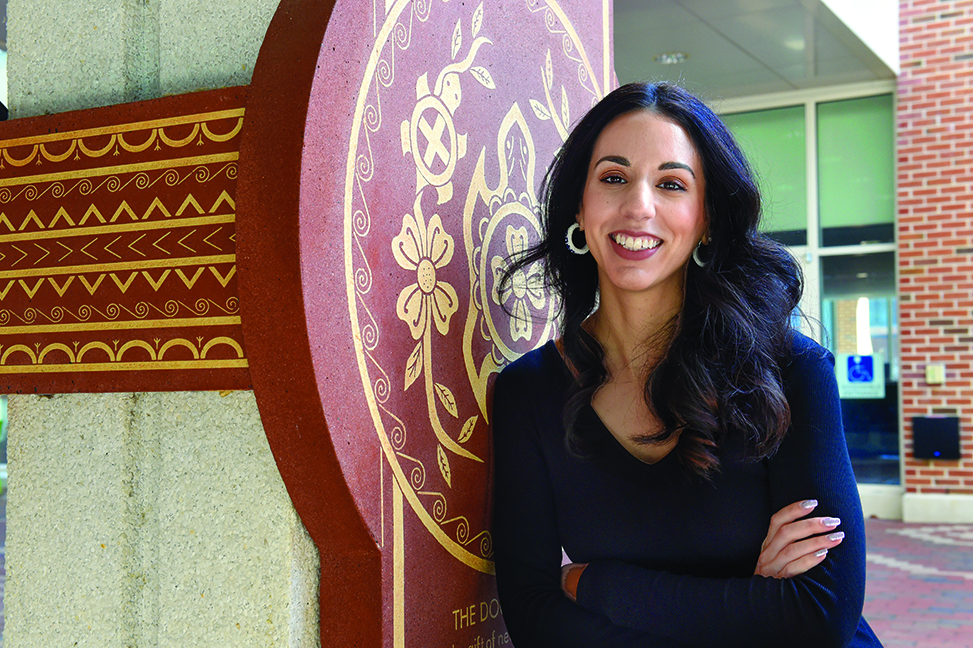
“Native people are not homogenous,” says Marissa Carmi. She is standing in front of “The Gift” installation by American Indian artist Senora Lynch near the Frank Porter Graham Student Union. (photo by Donn Young)
Graduate student Marissa Carmi is contributing to research about Oneida history, identity and sovereignty while supporting the larger narrative of Native diversity that has long been silenced.
Through research about Oneida history and sovereignty, Marissa Carmi hopes to document and demonstrate the diversity of thought across Native nations in the United States, deconstructing stereotypes about Native people.
Carmi is a Ph.D. student in American Indian and Indigenous studies and a citizen of the Oneida Nation of Wisconsin. She said her work on studying both her own people as well as the Oneida Indian Nation in New York “is part of a broader effort to demonstrate that Native people are not homogenous … we are not a monolith. We have a diversity of ideas in Indigenous communities that is vibrant, and I want to show that.”
Before coming to UNC-Chapel Hill, Carmi worked for the Administration for Native Americans, where she assisted members of Native tribes and organizations applying for community development grants. Carmi said she was inspired by the diversity and creativity in the project proposals. This work prompted her to consider the variety of approaches different Oneida citizens take to define tribal nationhood and the future of their communities.
At UNC, Carmi combines textual analysis, ethnographic work and oral histories to study the visions of Oneida citizens for their future and their contributions to defining Oneida nationhood and sovereignty.
Carmi hopes that her research will be a meaningful resource for other Oneida citizens. She said that a major misconception is that all Native people have a thorough understanding of their respective histories.
“Maybe I will write this history that tribal members from both the Oneida Nation in New York and the Oneida Nation in Wisconsin will read and think ‘Wow, I did not know this about us, about our history.’ That would be exciting.”
Carmi attributes understanding her identity to her mother, who is an activist and educator. Early on, her mother connected Carmi and her sister to the thriving Native community in Washington, D.C., where Carmi was raised. She also brought them to Oneida, Wisconsin, to visit extended family.
In addition to research, Carmi works as a graduate teaching assistant. This semester, she is leading her own class, “Approaches to American Indian and Indigenous Studies.” She said she enjoys the collaborative nature of the classroom.
“When I’m in the classroom and I’m exchanging ideas with students, it’s just pure fun for me,” she said.
Outside of academics, Carmi is co-president of the First Nations Graduate Circle, a support network for both Native and non-Native graduate students involved in the Native community on campus. She is also a member of the College of Arts and Sciences’ Working Group on Global Indigeneity and American Indian Studies, which was formed last fall to lead and direct the shaping of a reimagined American Indian and Indigenous studies curriculum at UNC.
One of the group’s first projects has been working with several academic departments on a cluster hire for the program. A cluster hire is a creative approach toward advancing a curriculum by hiring outstanding and diverse faculty across disciplines who will collaborate with one another. In this instance, the faculty will have departmental homes in American studies, geography, religious studies and women’s and gender studies.
Carmi’s love for collaboration has served her well in the working group as she enjoys the opportunity to think big. She said she feels optimistic about the program’s potential to serve Native communities across North Carolina, which has the second-largest Native population east of the Mississippi River, and beyond.
“I’m really interested in trying to build this program in a way that it becomes a model for how academia can serve tribal communities and how tribal communities can think of universities, specifically the UNC-Chapel Hill, as a valuable resource.”
By Andy Little ’24
Read more stories in Carolina Arts & Sciences magazine.
